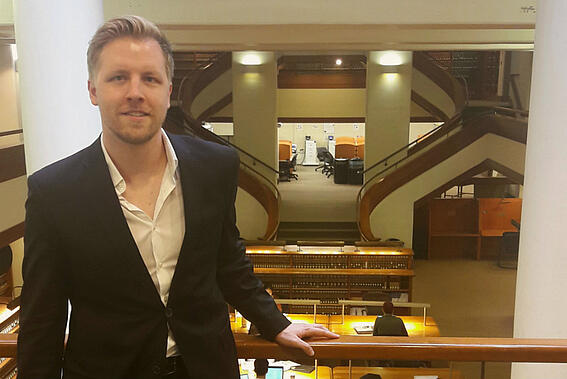What is your field of research? How long have you been working on the subject, and who is your supervising professor?
My field of research is commercial arbitration, with a particular focus on the comparative perspective of different national arbitration laws. I first came into contact with the subject of arbitration during my semester abroad at the University of Cape Town in 2011, where I had the opportunity to take an excellent LLM course in international commercial arbitration taught by the famous professor and practitioner Lise Bosman. Afterwards, I continued my studies at Bucerius Law School, with a main focus on international trade law and international dispute resolution, and have been working as a research assistant for Professor Thorn since 2014. Professor Thorn and Professor Kröll are the supervising professors for my dissertation, which I started writing in 2016.
On which topic are you writing your doctoral thesis?
My thesis concerns the extent of control exercised by national courts and national arbitration laws on the arbitral process and the arbitral award. The topic is dealt with mainly from a comparative perspective, in terms of which I consider the respective national approaches to the extent of control over arbitration with regard to national, international and a-national arbitration.
My thesis deals – among others – with these questions:
- How are national, international and a-national arbitrations and awards defined in the respective legislation?
- How can a-national awards be enforced?
- How does control differ in jurisdictions with separate regimes for national and international arbitration?
- To what extent can parties to the arbitral process derogate from state control? Can parties also agree to more control than the law and courts provide for?
- What is the conclusion to different extents of control?
Why is your research topic relevant?
Commercial arbitration is very popular, especially at the international level, meaning that disputes are rooted in more than one jurisdiction. In international commercial arbitration, there has been a constant increase in harmonization of national arbitration laws, as many jurisdictions incorporated the UNCITRAL Model Law in their national arbitration law or at least used the Model Law as a basis. However, despite increased harmonization, major differences still exist within the respective national arbitration laws. Those differences are unsurprising, as countries compete with each other regarding their attractiveness as an arbitration venue. Arbitration is a big business, and especially major arbitration centres such as New York, London, Paris, Singapore and Hong Kong will continue to make sure that they remain attractive venues for arbitration.
Every country generally has at least one law dealing with arbitration. Some countries (for example, Switzerland) have several arbitration laws, as they apply separate regimes to national and international arbitrations. The extent of control may then vary between the different regimes in one country. As a result, the level of control may play a role in the parties’ decision for or against an arbitral seat, and in consequence also in the decision of the lawmakers to modify their arbitration laws in order to create an arbitration law that is as attractive as possible to the parties.
What motivated you to pursue a research stay in the US?
The US suited my comparative approach ,as US law is similar to some continental European legislation, while using different methods and approaches. The approach of the US law further serves as an interesting contrast to the approach of the highly relevant English arbitration law.
Also, the US, and New York in particular, is a major venue for international arbitrations. Many of the leading US arbitration institutions are therefore based in New York City, where they also host events and have their databases and libraries. Furthermore, two of the leading academic institutions with some of the most renowned professors and practitioners, Columbia Law School and NYU School of Law, are also located in New York City. Both Professor George Bermann of Columbia Law School and Professor Franco Ferrari of NYU School of Law kindly agreed to supervise my research in the US, which gave me the unique opportunity for high-level discussions and great feedback regarding my research.
Could you share some impressions from your time abroad? How did you find the experience?
During my time in New York, I was fortunate to meet several other researchers from across the world, which led to fruitful discussions not only about the law itself, but also about different approaches with regard to research and writing. Professor Ferrari also greatly encouraged discussions about my thesis in general or specific questions that I was dealing with, and was always keen on providing support. Furthermore, he invited me to a conference on the interpretation of the New York Convention in Latin America, which also has points of contact with my thesis.
Further, it almost goes without saying that Manhattan is probably one of the most vibrant and culturally enriching places to spend one’s summer.
I am deeply grateful to Joachim Herz Stiftung, as this unique opportunity would have not been possible without their generous financial support. Also, I want to thank Kasia Kwietniewska of Bucerius Law School`s International Office for patiently providing support regarding all questions relating to the Joachim Herz scholarship and the research stay itself.

